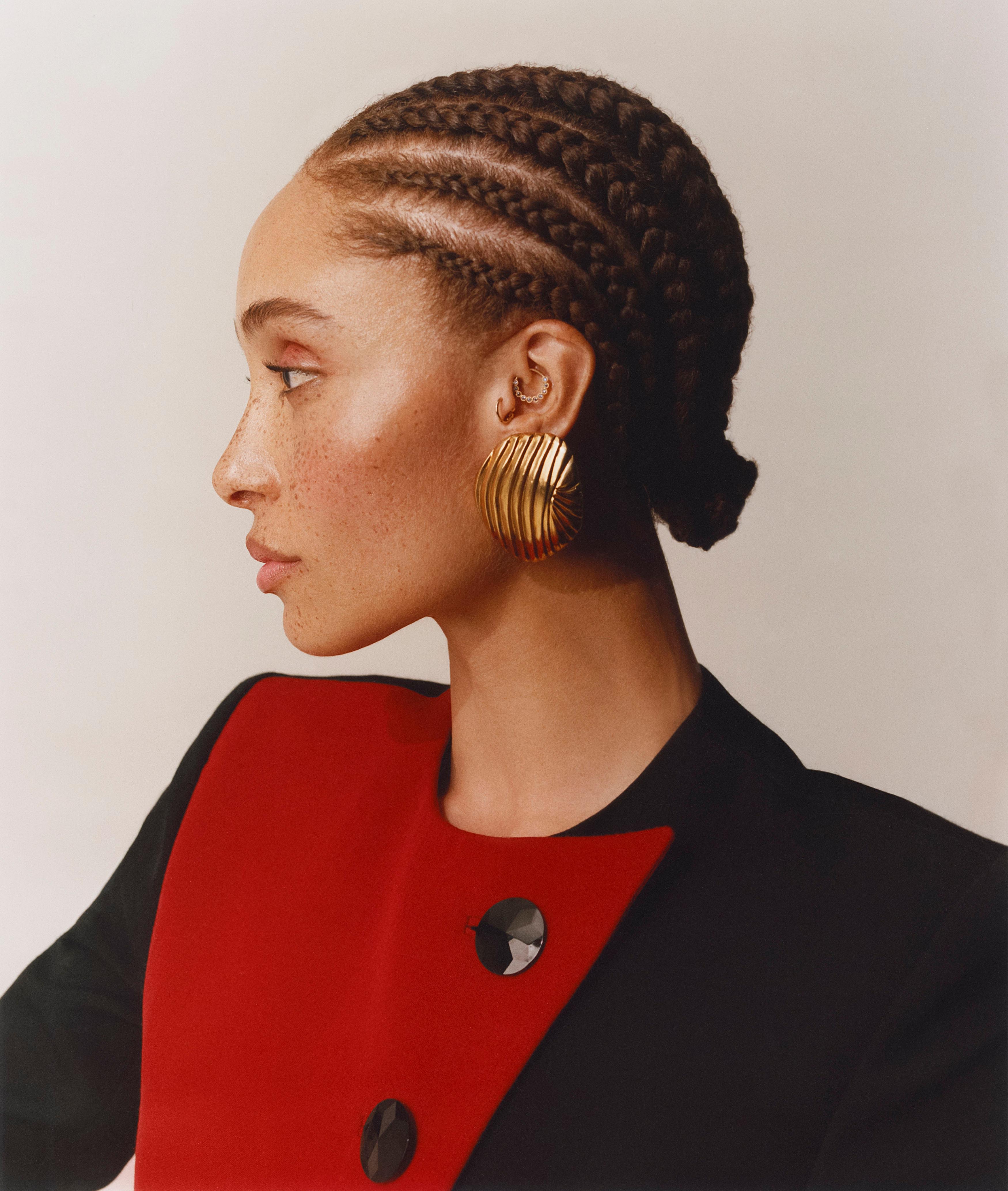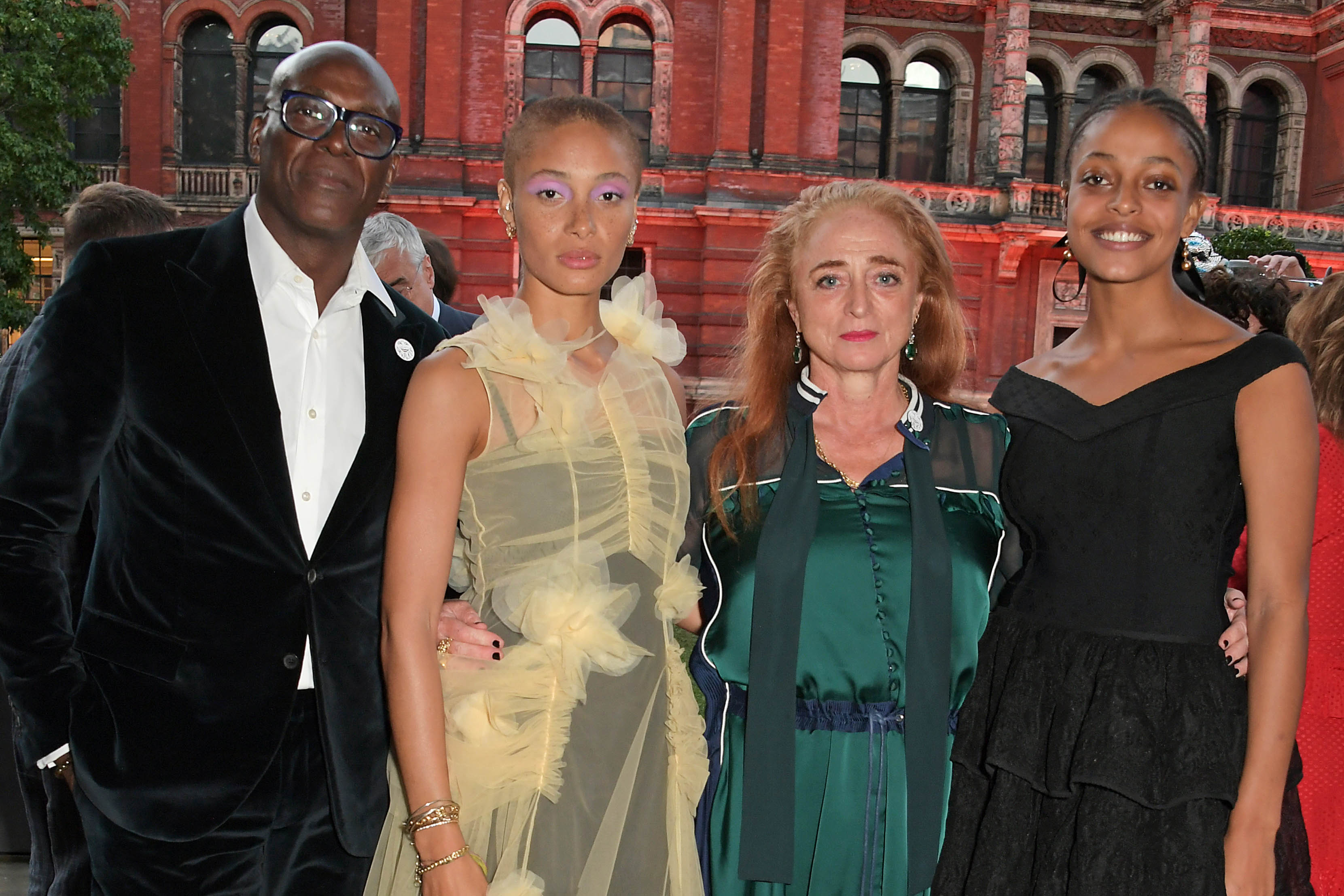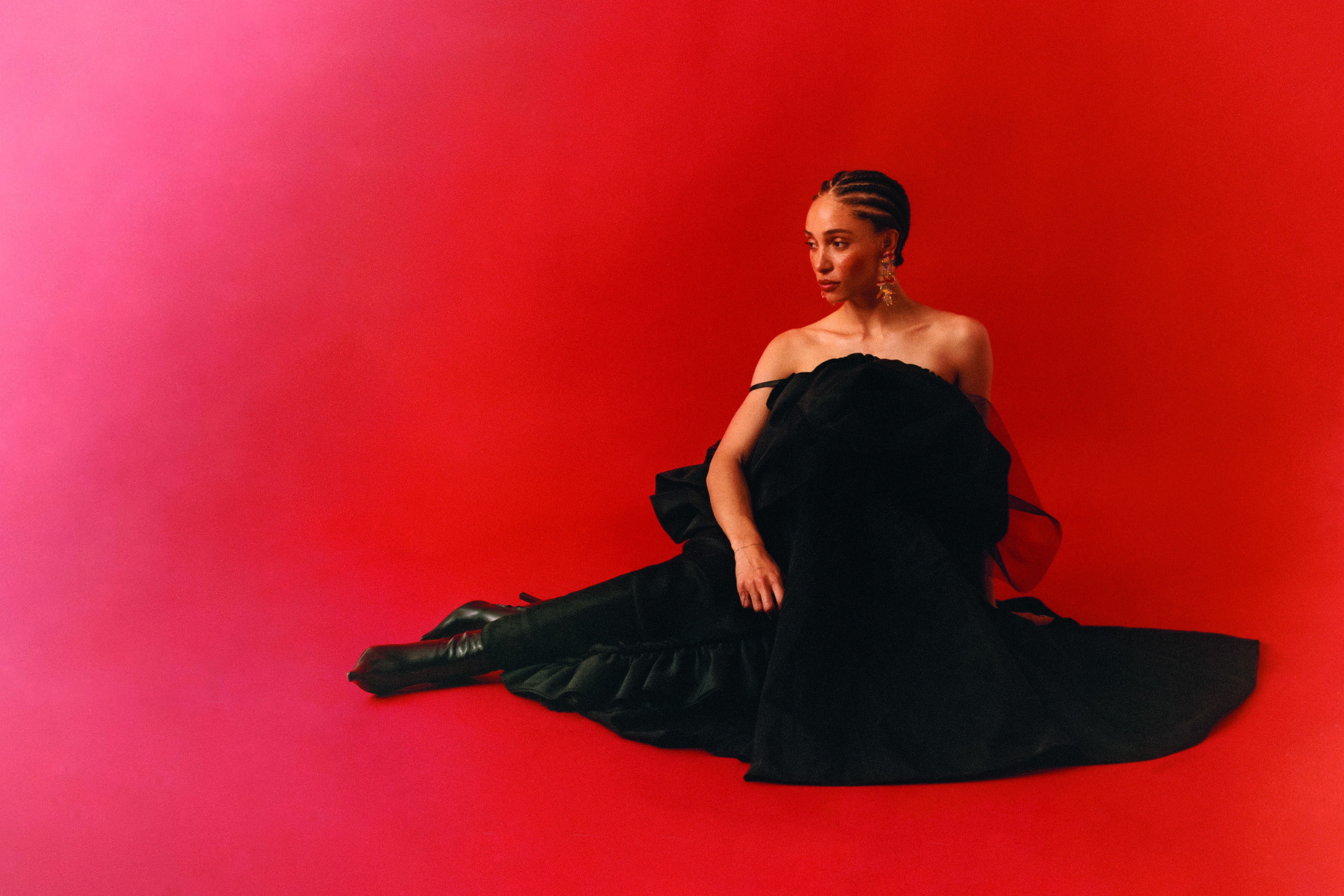The British supermodel Adwoa Aboah knows the names of the staff at all her favourite coffee shops, which sounds like the kind of faux-grounded tidbit a celebrity might let loose to an interviewer but which, in fact, turns out to be true. We meet at Don’t Tell Dad, her plush local, in the quaint, well-appointed suburb of Brondesbury Park. Outside, I had seen gorgeous fathers taking their children to school, and had passed someone who looked a lot like Bella Freud. When I entered the café, gingerly, I asked for a reservation that turned out not to exist and then a staff member realised what was happening. “Oh, are you here for Adwoa?” she asked, as though she were talking to a child lost in a supermarket. “Let me take you to your table.”
You will have seen Aboah, of course, plastered as she is on billboards from east London to Exeter to El Paso. In an era in which fewer and fewer models are finding major success – supplanted in magazines by actors and musicians and influencers – Aboah, who is 33, is a rare exception. She has become, in a decade, one of the most recognisable faces of her generation, a star in high fashion campaigns for Calvin Klein and high-street shoots for H&M, a Vogue cover girl the world over.
It is not a stretch to say she is one of the most beautiful people I’ve met. And so when she arrives tired at Don’t Tell Dad, thanks to a teething child who “doesn’t sleep”, wearing smeared makeup from a British Vogue shoot the day before, clad in Uggs and head-to-toe Supreme sweats, greeting me with a raspy, “Heyyyyy,” she still carries an aura of glamour.

She is currently trying to juggle motherhood with the management of a non-profit, her mental health advocacy group Gurls Talk, and two full-time jobs. She recently returned to modelling after a couple of years away to focus on being a present parent, and a few days earlier launched the Veil, a handbag range established in partnership with her friend, the New Zealand designer Georgie Wright.
I say she appears… busy.
“People want to take meetings,” she says, sipping her “very silly order” of a mocha. “People want to get samples. I’ve got to go through selects for the Instagram. Georgie’s designing the next collection for February…” She shrugs.
The Veil is Aboah’s first time running a brand, and she’s been required to plunge headfirst into a world of spreadsheets, budgets and meetings with prospective investors. And then there’s the glamorous stuff, too. A couple of weekends ago she hosted a dinner at the Broadwick hotel in Soho with a gaggle of London’s coolest, most stylish women: the actor Yara Shahidi, the stylist Ch’lita Collins, the TikTok presenter Lea Ogunlami. “I actually hate most of those dinners,” she says. “Most people do.” And yet she persisted. “I know what Georgie and I have poured into the Veil, and I know what we want it to be and who we want to wear it. And most of the people there, I just, like, fuck with them on such a major level.” She considers these women to be true originals. “It’s exciting when I spot people who are just doing it in their own way,” she says. “They’re not bothered by the fashion echo chamber.”
I am respected. I have a community of people who like me for more than how much weight I’ve lost
As a teenager, Aboah “wasn’t necessarily a handbag girl,” she says, though both of her parents work in fashion. Her father, Charles Aboah, is a location scout for editorial shoots. Her mother, Camilla Lowther, was a model who later founded a management agency. Aboah vaguely remembers her godmother giving her exceptionally cool handbags – she doesn’t remember which ones – but as a teenager she mostly liked shopping for vintage. She coveted items from Mulberry and Stella McCartney, and Paul’s Boutique. But most of the time, “Whatever money I had needed to be spent on the best pair of jeans, or coffee at Caffè Nero.” She goes on, “With age I’ve become a bag-wearer. Before, I was like: pockets!”
It’s more challenging than ever to start a business, especially one selling £1,000 handbags. There is a covert, ambient worry in fashion that Ozempic may curb more than just culinary appetites. A recent NPR report suggested that GLP-1 drugs may also lessen the impulses that lead to the kind of shopping sprees that end in luxury sales. Aboah says she’s read about the ways in which GLP-1s can help people with addictive tendencies – Aboah herself became sober at 22, after drinking and using drugs as a teenager – but she hasn’t heard about its potential impact on shopping. “I know restaurants are really suffering – everyone’s just like, doing starters or sharing,” she says. “But I’m friends with all the shop assistants. Like, I know them all to my detriment. And it’s very interesting talking to them, because things are flying off the shelves that you didn’t think would sell.”

Model family: Charles Aboah, Adwoa Aboah, Camilla Lowther and Kesewa Aboah at the V&A in 2019
The rise of Ozempic has coincided with the fact that, in fashion, thin is back, a trend Aboah has been noticing for a few years now. “We’ve just got to, I suppose, keep on fucking plodding along, screaming from the top of our lungs. Like, what curve girls do we see in the shows? Obviously there’s P [Paloma Elsesser], but it’s changing… Everyone is very thin,” she says. “What do you think? Do you think if we’re seeing people who once spoke quite openly about body positivity lose insane amounts of weight, do you think there needs to be a conversation about that? Do you think they owe their community or the public? Or do you think we’re asking too much?”
When Aboah returned to modelling after having her baby, a daughter named Shy, she felt alarmed by how thin everyone seemed. “It’s one thing fitting back into your own clothes,” she says. “It’s another thing watching the landscape of fashion be so thin that you’re like, my body could never be this. Everyone was like, when are you going to come back to work? It’s like, babe, I don’t know!”
Having a baby has given Aboah a new perspective on modelling. She loves it still, but now “time has this new meaning, because any time away is time I’m missing with Shy.” When people began to fixate on her own postpartum weight loss, she realised that fashion was no longer central to her life.
“I went to London Fashion Week in September and it was wonderful, and I was really happy to be back in the mix. But all anyone could talk about was the weight I’ve lost… I just have to let it go. I know how to do my job. I’m respected, I have a community of people who like me for more than how much weight I’ve lost. I have so much self-worth away from what magazine covers I’ve been on.”
Now she’s back in the swing of things and feels excited about how she can engage with modelling in this slightly more detached way.
“I always knew I was going to be a working mum, so I’m having to learn what that looks like. I’m trying not to be so scared about finding this new identity – it will be revealed to me, and I’m excited,” she says. “I’m excited to be transformed, to be quite honest. It happened when I got sober. It happened when I started Gurls Talk. I’m not someone who likes to stay stagnant.”
Adwoa Aboah in numbers
16 First signed with Storm agency
22 Age when she became sober
1 Model of the Year titles
259,000 Followers on Gurls Talk Instagram
£1,740 Price of Snap Bag from the Veil
$1,000,000 Earned from modelling in 2017
Photograph by Getty Images
